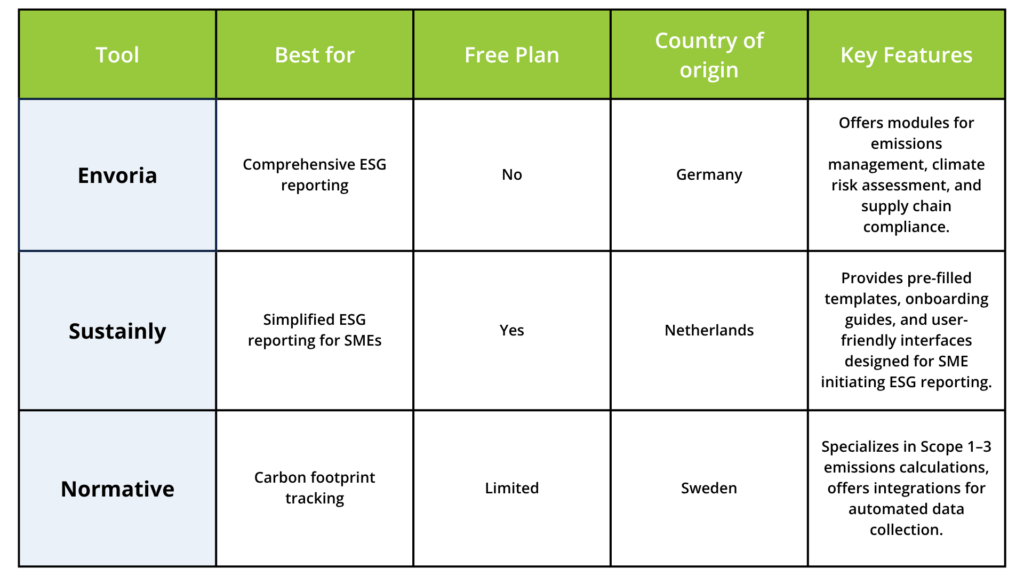As of 2025, ESG compliance is no longer optional for many small and medium-sized enterprises (SMEs) across Europe. With the Corporate Sustainability Reporting Directive (CSRD) taking effect, the shift toward mandatory Environmental, Social, and Governance (ESG) reporting is now a defining part of doing business in the EU.
But where does that leave SMEs?
Especially companies with limited resources — no ESG officers, no sustainability teams, no investor pressure. Just growing businesses trying to stay compliant and competitive.
Let’s explore what’s changing, what’s expected, and how Sweden’s ESG maturity offers a model for the rest of Europe.
What Is ESG Compliance, and Why It Matters in 2025
Environmental, Social, and Governance (ESG) compliance refers to how a business measures and discloses its sustainability practices, social impact, and internal governance. In 2025, ESG compliance will increasingly influence:
- Procurement decisions (especially in Sweden and the Nordics)
- Banking and lending criteria
- Access to public funding
- International partnerships
- Client and investor trust
Even SMEs not directly obligated under CSRD will face rising expectations from larger clients, regulators, and consumers.
2025 ESG Regulations – What SMEs Need to Know
The EU Corporate Sustainability Reporting Directive (CSRD) expands ESG reporting to around 50,000 companies across Europe, up from just 11,600 under previous rules.
You may be impacted if your company:
- Has more than 250 employees, OR
- Has a turnover above €40 million, OR
- Is part of a supply chain with ESG-reporting obligations
Key changes include:
- Use of European Sustainability Reporting Standards (ESRS)
- Third-party auditing of ESG data
- Disclosure of Scope 1, 2, and (eventually) 3 emissions
- Governance and diversity metrics
- Digital tagging of ESG data (for comparability)
ESG Reporting Growth Among SMEs (2022–2025)

In Estonia, over 70% of startups track some ESG metrics, even without mandatory compliance.
Finland’s ESG reporting adoption among SMEs rose 40% from 2022 to 2024 (Source: Business Finland).
Why Sweden Is Ahead of the ESG Curve
Sweden ranks among the most ESG-compliant countries in the world, according to Yale’s Environmental Performance Index and OECD sustainability benchmarks.
Key reasons:
- Sustainability as strategy: ESG is not just a legal burden — it’s a core market differentiator.
- Transparent tax and governance structures
- Procurement standards that heavily favor ESG-compliant vendors
- Widespread use of digital reporting tools even among micro-businesses
In Sweden, 84% of SMEs say they consider sustainability a competitive advantage (source: Swedish Agency for Economic and Regional Growth, 2024).
1 in 3 public procurement contracts in Sweden now include explicit ESG criteria — a trend expanding across the Nordics and EU.
For international founders, this means one thing: if you’re building or expanding in Sweden, getting ESG right is critical.
What Swedish SMEs Prioritize in ESG

1Office Insight: What SMEs Are Doing (and Missing)
After helping hundreds of clients register and operate in Sweden and across Europe, we’ve noticed some clear patterns:
Most common early wins:
- Switching to remote-first operations (low Scope 2 emissions)
- Introducing diversity policies (especially for international teams)
- Starting basic sustainability tracking with digital tools
Most common pitfalls:
- Assuming ESG only matters for large enterprises
- Treating reporting as an annual task, not a strategic asset
- Not preparing for client-driven ESG audits or disclosures
Whether you’re starting a business in Sweden, Estonia, or the UK, 1Office helps SMEs stay compliant with new ESG expectations from day one — from digital document storage to remote team setups that lower emissions.
ESG Tools for SMEs in 2025
You don’t need SAP or Salesforce to comply. Several new ESG reporting tools for small businesses are entering the market, including:
- Envoria – simplified ESG reporting with dashboards and automated reporting workflows
- Normative (Swedish origin) – carbon accounting for startups and small teams
- Sustainly – basic ESG reporting, pre-filled templates
Best ESG Tools for Small Businesses in 2025
What SMEs Should Do Now
Here’s your action plan for ESG compliance in 2025:
- Start with materiality Identify which ESG issues truly matter to your business and your stakeholders. (For example: emissions vs. diversity vs. governance.)
- Use simple metrics Track what you can measure now: energy use, employee wellbeing, remote work impact, supplier ethics.
- Build a “starter” report Don’t overcomplicate. A 3-page ESG summary is better than none.
Final Thought: ESG Is the New Trust Signal
Just like GDPR became the default for data privacy, ESG is becoming the default for business responsibility.
Whether you’re expanding into Sweden, servicing EU clients, or just want to future-proof your business — ESG isn’t just about ticking boxes. It’s about showing that you’re serious about operating responsibly in a changing world.
The shift is real. And it’s happening now.
Want help future-proofing your SME for ESG compliance? Contact us for setup guidance in Sweden, Estonia, or beyond.



